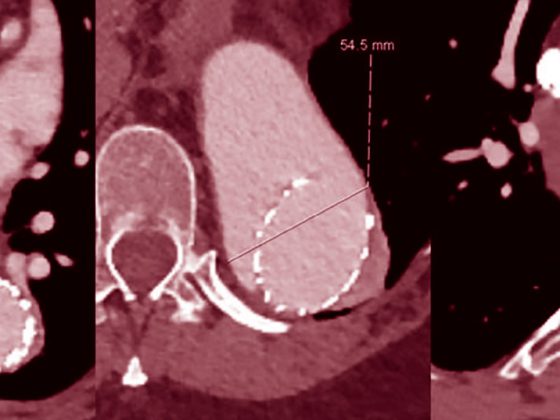Treatment options are often limited in both prostate and breast carcinoma. The search for new effective drugs and combination therapies is therefore the primary goal of current studies.
For early metastatic but still hormone-sensitive prostate cancer (mHSPC for short), androgen deprivation therapy (ADT) was considered the only palliative medical standard in the past decades. In fact, early and deep ADT, with which men achieve castration levels currently ≤20 ng/dl testosterone within the first year of treatment, is long-lasting effective and prevents progression to hormone-refractory PCa for up to ten years [1]. However, recent studies show that chemotherapy-naive patients in this early tumor phase of mHSPC benefit even more from a combination of ADT plus chemotherapy using docetaxel [2,3].
The current S3 guideline recommends combined ADT plus docetaxel
The study results of the CHAARTED study [2] and the STAMPEDE trial [3] are so convincing that the currently valid S3 guideline “Prostate Cancer” of the German Society of Urology e. V. (DGU) recommends “patients in good general condition (ECOG 0-1) with metastatic (M1) hormone-sensitive prostate cancer should be treated with androgen deprivation”. (DGU) recommends that “patients in good general condition (ECOG 0-1) with metastatic (M1), hormone-sensitive prostate carcinoma should be offered chemotherapy with docetaxel or supplementary anti-hormonal therapy with abiraterone (plus prednisone/prednisolone) in addition to androgen deprivation” [4].
CHAARTED and STAMPEDE: The data situation
The combination of ADT and docetaxel was shown to be visibly superior to palliative ADT treatment alone for mHSPC (M1) in the CHAARTED trial [2]. When combined with docetaxel, overall survival of treated PCa patients increased by an additional 13.6 months [2].
Comparable results were shown by the STAMPEDE trial, which is a multi-arm study that continuously compares the impact of all currently available treatment regimens [3]. In the study arm comparing docetaxel plus ADT with the standard of care at the time (ADT), investigators found a prolongation of median overall survival of approximately ten months in patients with mHSPC [3].
Are there comparably effective alternatives to chemotherapy?
A still major problem in the treatment of prostate cancer are the “high risk/high volume” patients who carry a very high tumor burden or metastasize very early. What can be offered to these men if docetaxel plus ADT fails, and biochemical progression (PSA rise on ADT) occurs? In the “high risk/high volume” situation, abiraterone could be used. This supports the anti-hormone therapy and thus additionally lowers the PSA level.
Abiraterone has comparable efficacy to docetaxel on overall patient survival. Therefore, it is also approved in first-line therapy for mHSPC and is recommended in the guideline on par with docetaxel [4]. However, it is important (in parallel with abiraterone administration) to give patients protective prednisone. The rationale behind it: Abiraterone increases the risk of hypertension and especially hypokalemia.
New combination therapy with CDK4/6 inhibition in breast carcinoma
As with male cancer, a great deal has happened in the treatment of breast cancer in recent months and years. Endocrine therapy remains the standard of care for advanced receptor-positive breast carcinoma. Nevertheless, the hormone resistance that develops in the tumor over time presents physicians with a problem that cannot be solved satisfactorily for all patients due to the limited treatment options available to date.
However, in recent years, two so-called “monotargeted” CDK4/6 inhibitors, palbociclib and ribociclib, have become available and, in combination with endocrine therapy, have significantly shaped the first- and second-line treatment of advanced and/or metastatic breast cancer. Abemaciclib, another CDK4/6 inhibitor, has now been approved throughout Europe (not in CH) since October 1, 2018, but as a “multitargeted” inhibitor it has a broader spectrum of activity against a number of kinases.
Why is there a need for CDK4/6 inhibitors in breast cancer?
Hormone resistance in breast carcinoma is still one of the biggest therapeutic problems. It may already be primary, or secondary hormone resistance may occur in the course of further disease development and metastasis under anti-hormonal therapy. In addition, it is possible that tumor cells may enter alternative signaling pathways and also exit these pathways when selection pressure is applied by a treatment regimen. Such resistances are then due to a wide variety of changes, e.g.:
- Hormone receptor mutations,
- alternative ERα splicing,
- Total estrogen receptor (ER) loss,
- Disorders of the cell cycle regulation as well as
- switching to alternative signal paths.
If anti-hormone therapy and alternative approaches such as mTOR inhibition failed, the end of therapeutic options without chemotherapy was very often reached before the discovery of CDK4/6 inhibitors. However, with the new CDK4/6 inhibitors, there is another very effective and proven treatment option in metastatic breast cancer.
CDK4/6 inhibitors in first-line therapy
In all three pivotal trials, PALOMA-2 (palbociclib) [5], MONARCH-3 (abemaciclib) [6], and MONALEESA-2 (ribociclib) [7], progression-free survival was significantly better in the combination with CDK4/6 inhibition than in the placebo arm plus standard. On average, PFS ranged from 9.3 to 13.5 months, depending on the study and agent, compared with endocrine therapy plus placebo [5–7]. The relative overall response was more than 50%. Moreover, the three combination therapies were effective in all subgroups studied.
Side effects may occur, but these do not affect the quality of life in the long term. Cases of neutropenia – more rarely febrile neutropenia – liver enzyme elevation, diarrhea, and QTc time prolongations >480 ms depending on the substance administered have been described [5–7].
CDK4/6 inhibition in second-line treatment.
The pivotal trials (PALOMA-3 [8], MONARCH-2 [9], MONALEESA-3 [10]) also showed significant improvement in PFS in the second-line setting for the CDK4/6 inhibitors palbociclib, abemaciclib, and ribociclib compared with endocrine therapy alone. Second-line PFS ranged from 4.9 to 7.7 months, depending on the agent used [8–10].
Take-Home Messages
mHSPC
- Based on the convincing increase in overall survival of up to 13.6 months, six cycles of docetaxel in combination with
- of ADT is recommended as standard therapy for chemotherapy-naive patients with mHSPC.
- “High risk/high volume” patients, on the other hand, might benefit more from the comparably high potency abiraterone.
Breast Cancer
- Endocrine therapy remains the standard of care for the treatment of advanced breast carcinoma. Metastasis and hormone resistance remain a difficult therapeutic situation.
- However, with the new CDK4/6 inhibitors, an effective combination therapy option now exists in first- and second-line breast cancer.
- This combination of therapies is worthwhile for patients, whose progression-free survival increases as a result by 9.3-13.5 months in the first-line setting and by 4.9-7.7 months in the second-line setting.
Sources: DGHO Congress, September 28-October 2, 2018, Vienna (A).
Literature:
- Klotz L, et al: Nadir testosterone within first year of androgen-deprivation therapy (ADT) predicts for time to castration-resistant progression: a secondary analysis of the PR-7 trial of intermittent versus continuous ADT. J Clin Oncol 2015; 33: 1151-1156.
- Sweeney CJ, et al: Chemohormonal Therapy in Metastatic Hormone-Sensitive Prostate Cancer. N Engl J Med 2015; 373: 737-746.
- James ND, et al: Addition of docetaxel, zoledronic acid, or both to first-line long-term hormone therapy in prostate cancer (STAMPEDE): survival results from an adaptive, multi-arm, multistage, platform randomised controlled trial. Lancet 2016; 387: 1163-1177.
- Interdisciplinary guideline of S3 quality for early detection, diagnosis and therapy of the different stages of prostate cancer. Short version 5.0. 2018 April; AWMF registry number 043/022OL.
- Finn RS, et al: PALOMA-2: Primary results from a phase III trial of palbociclib (P) with letrozole (L) compared with letrozole alone in postmenopausal women with ER+/HER2- advanced breast cancer (ABC). J Clin Oncol 2016; 34(15): 507-507.
- Goetz MP, et al: MONARCH 3: Abemaciclib As Initial Therapy for Advanced Breast Cancer. J Clin Oncol 2017; 35(32): 3638-3646.
- Hortobagyi GN, et al: Ribociclib as First-Line Therapy for HR-Positive, Advanced Breast Cancer. N Engl J Med 2016; 375: 1738-1748.
- Cristofanilli M, et al: Fulvestrant plus palbociclib versus fulvestrant plus placebo for treatment of hormone-receptor-positive, HER2-negative metastatic breast cancer that progressed on previous endocrine therapy (PALOMA-3): final analysis of the multicentre, double-blind, phase 3 randomised controlled trial. Lancet Oncol 2016; 17(4): 425-439.
- Sledge GW, et al: MONARCH 2: Abemaciclib in Combination With Fulvestrant in Women With HR+/HER2- Advanced Breast Cancer Who Had Progressed While Receiving Endocrine Therapy. J Clin Oncol 2017; 35(25): 2875-2884.
- Slamon DJ, et al: Phase III Randomized Study of Ribociclib and Fulvestrant in Hormone Receptor-Positive, Human Epidermal Growth Factor Receptor 2-Negative Advanced Breast Cancer: MONALEESA-3. J Clin Oncol 2018; 36(24): 2465-2472.
InFo ONCOLOGY & HEMATOLOGY 2018; 6(5): 43-44.











